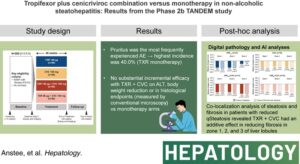TANDEM study shows potential of HistoIndex SHG/TPE imaging and AI-based technology in evaluating the effects of combination therapy for NASH
SINGAPORE, June 15, 2023 – Recent findings from the TANDEM study (NCT03517540) in 193 patients with nonalcoholic steatohepatitis (NASH) reveal the use of HistoIndex’s Second Harmonic Generation/Two-Photon Excitation (SHG/TPE) imaging and Artificial Intelligence (AI) in providing mechanistic details for the evaluation of NASH treatment with compounds of different mechanisms of action. The study, published recently in Hepatology, compared the effectiveness of Tropifexor plus Cenicriviroc combination therapy versus monotherapy1.
The study found that the AI-based analysis using SHG/TPE digital pathology was able to detect effects seen in different zones of the liver lobule that may not have been detected using conventional microscopy. In addition, co-localization analysis substantiated an association of a regression in fibrosis occurring in zones of the liver lobule with a concomitant reduction of steatosis and hepatocyte ballooning. The fully quantitative co-localization and zonal assessment has the potential to provide greater details in evaluating the effects of combination therapy for NASH. Tropifexor is a selective agonist of farnesoid X receptor (FXR), which regulates bile acid metabolism and inflammation. Cenicriviroc is a dual antagonist of C-C chemokine receptor type 2 (CCR2) and C-C chemokine receptor type 5 (CCR5), which are involved in inflammation and fibrosis.
Says Professor Quentin Anstee, Professor of Experimental Hepatology & Honorary Consultant Hepatologist, Newcastle University, and principal author of the study, “These findings have far-reaching implications in the research and development of NASH treatments, which due to the absence of any regulatory approved drug, is a growing public health concern worldwide. Digital pathology and AI are increasingly recognized as important tools that generate valuable additional data, informing our understanding of disease progression and regression, as we seek effective treatments for NASH”.

About HistoIndex (www.histoindex.com)
Founded in 2010, HistoIndex is the first in the world to provide stain-free, fully automated imaging solutions for visualizing and quantifying morphological and architectural features of fibrosis in biological tissues. Using a digital pathology system comprising breakthrough biophotonic technology and ML/AI-based analysis, HistoIndex provides products and services in tissue research and diagnostics. HistoIndex equips researchers with reliable cutting-edge tools for their scientific work and clinicians with a stain-free, automated, consistent, and high throughput imaging platform to assist in speedy and accurate diagnosis of fibrosis and cancer. Based on revolutionary imaging solutions, the products developed have opened doors to new medical standards that aid in clinical diagnosis, benefit clinical research, and speed up pharmaceutical drug and treatment development.
References
1. Anstee, Quentin M; Lucas, Kathryn J.; Francque, Sven; Abdelmalek, Manal F.; Sanyal, Arun J.; Ratziu, Vlad; Gadano, Adrian C.; Rinella, Mary; Charlton, Michael; Loomba, Rohit; Mena, Edward; Schattenberg, Jörn M.; Noureddin, Mazen; Lazas, Donald; Goh, George BB.; Sarin, Shiv Kumar; Yilmaz, Yusuf; Martic, Miljen; Stringer, Rowan; Kochuparampil, Jossy; Chen, Li; Rodriguez-Araujo, Gerardo; Chng, Elaine; Naoumov, Nikolai V.; Brass, Clifford; Pedrosa, Marcos C. Tropifexor plus cenicriviroc combination versus monotherapy in non-alcoholic steatohepatitis: Results from the Phase 2b TANDEM study. Hepatology | DOI: 10.1097/HEP.0000000000000439
Media contact
Yuzu Tay (media@histoindex.flywheelsites.com)
